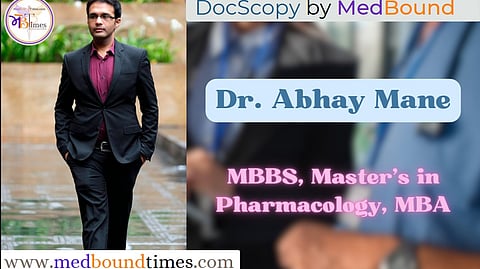Himani Negi: Hello Sir, and welcome to this DocScopy session with MedBound Times. Please tell us something about your professional life.
Dr. Abhay Mane: Hello, everyone, and thank you so much, MedBound, for having me here today. My name is Dr. Abhay Mane. Currently, I am pursuing my MBA in the United States at the University of Minnesota Carlson School of Management. It has been quite a long journey. I completed my MD in Russia and earned my master’s degree in pharmacology from the UK. Afterward, I worked in medical affairs in the pharmaceutical industry for slightly over eight years. Now, I am exploring opportunities on the commercial side of the field, leveraging my MBA experience in the US.
Himani Negi: Why did you decide to pursue MBBS from Russia, and was it your first choice?
Dr. Abhay Mane: Yeah, I'll tell you what happened. It's a slightly unfortunate story. There was a University of St. Lucia in Central America that had started a medical school very close to Mumbai, on the outskirts. I got enrolled and studied there for around eight months. It was reasonably expensive, not super expensive, but being a private school, it had its costs.
But then, the school unfortunately closed down after receiving a notification from the Medical Council of India. The Medical Council of India clarified that anyone wanting to study at a foreign university should go abroad and study. They required proof when appearing for the Foreign Medical Graduate Examination (FMG). They emphasized that schools operating on Indian campuses were not legal and should be shut down. So, my medical college had to shut down within eight months.
At that point, you have a certain mindset that time is slipping away, considering I had already lost a year. I felt an urgency to start again, no matter what the circumstances. Russia seemed like a more affordable option compared to private Indian schools. I wasn't prepared to go through the medical entrance exams again. Luckily, a very good friend of mine from the same school also expressed interest in studying in Russia. Having company made Russia a reasonable choice.
I was quite young, around 18 or 19 years old, and making the decision to spend six years in Russia away from family was bold. Especially given the challenges of language, weather, and being away from home for the first time, it was quite tough.


